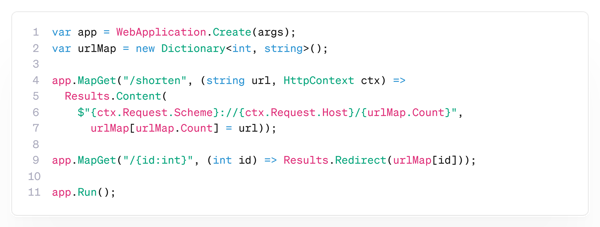I'm always exploring the simplicity in software development. As complexity naturally creeps into software projects, I find joy in crafting minimal, clear examples that illustrate key concepts. One of the reasons I enjoy working with AI agents, especially for my side projects, is because it's now good enough to empower me with incredibly rapid iterations to discover elegant, simple solutions.
Take, for instance, writing a URL shortener—an ideal candidate for minimalism. At first glance, a URL shortener seems straightforward: accept a long URL and generate a shorter version that redirects to the original URL. Here's a minimalist implementation in C# using .NET's minimal API:

Initially, this implementation appears ideal—it's concise, easy to read, and functional. Yet, complexity emerges as soon as we consider factors beyond the immediate scope. What about hosting, persistence, concurrency, scalability, analytics, security, and content moderation. Suddenly, a "simple" project balloons into something much larger, but oddly shortening a url is still possible in less than 10 lines of code.
Why does this happen? Because simplicity in software isn't merely brevity. Tools like AI agents allow us to rapidly prototype and iterate on core ideas, exploring the tipping point where clarity yields to complexity. By recognizing where complexity naturally arises, we can better understand how to keep our solutions maintainable and clear, embracing complexity only when truly necessary. GitHub Project ShortUrl
test123 asdf asdf